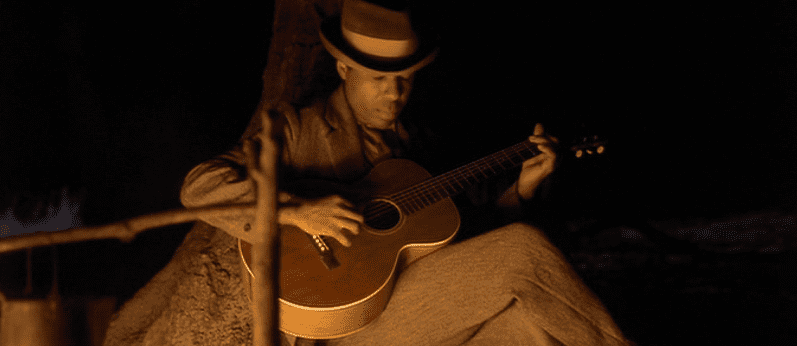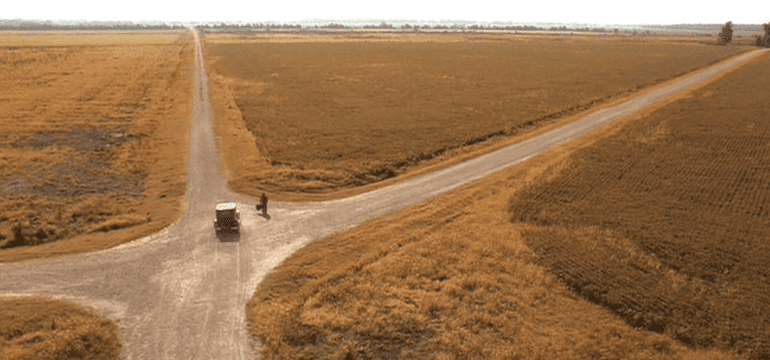In the iconic 2000 film O Brother, Where Art Thou?, the Soggy Bottom Boys encounter guitarist Tommy Johnson, played by Grammy-award-winning blues artist Chris Thomas King, who has sold his soul to the devil at the crossroads to play the guitar with great skill.
Before parting ways with the trio, Tommy Johnson plays the lonesome tune “Hard Time Killing Floor Blues” for the boys around a campfire.
“Hard Time Killing Floor Blues” is featured on the Grammy-nominated soundtrack and has arguably become the most famous cover of the song, but the song’s history dates much farther back than the year 2000.

The Man Behind the Blues
“Hard Time Killing Floor Blues” has been covered for decades by several famous artists, but its origins have deep, sorrowful roots in The Great Depression. Skip James wrote the song in 1931, during not only The Great Depression but also in the deep, Jim Crow South.
Nehemiah Curtis “Skip” James was a Delta Blues artist born and raised in the small town of Bentonia located in Yazoo County, Mississippi. As a young man, Skip idolized local musician Henry Stuckey and learned to play guitar from him.
Skip’s early influence from Stuckey planted a seed that would grow into one of the greatest blues artists of all time. His music is distinguishable from any other musician in modern history. His signature minor-key sound and fingerpicking guitar-playing technique have given his music a dark and gritty feeling unlike any other artist back then.
In 1931, Skip’s talent was finally noticed. Skip James auditioned for local talent scout and record store owner H.C. Spier, who recognized the unadulterated talent that James possessed. Spier sent James to record at Paramount Records in Grafton, Wisconsin, where he recorded “Hard Time Killing Floor Blues” in a makeshift studio in the Wisconsin Chair Factory’s attic.
Hard Time Killing Floor Blues Lyrics:
“Hard time here and everywhere you go
Times is harder than ever been before
And the people are driftin’ from door to door
Can’t find no heaven, I don’t care where they go
Hear me tell you people, just before I go
These hard times will kill you just dry long so
Well, you hear me singin’ my lonesome song
These hard times can last us so very long
If I ever get off this killin’ floor
I’ll never get down this low no more
No-no, no-no, I’ll never get down this low no more
And you say you had money, you better be sure
‘Cause these hard times will drive you from door to door
Sing this song and I ain’t gonna sing no more
Sing this song and I ain’t gonna sing no more
These hard times will drive you from door to door”
Behind the Lyrics
“Hard Time Killing Floor Blues” paints the picture of extreme poverty and despair, which rings true to the time period it was written and recorded in. Although famous guitarist Howard Sumlin says that the term “killing floor” refers to “a woman having you down,” it’s obvious that Skip James uses this in a different context.
Skip James wrote the song in the Jim Crow south during The Great Depression, signifying just how difficult life was for him back then. During The Great Depression, people were subject to drifting from door to door, finding any way possible to make a living. James’ lyrics perfectly convey this sense of uncertainty and desperation, almost putting the listener in his shoes.
The term “killing floor” is an analogy for the depression in this case, but historically, “killing floor” refers to the cold slaughterhouse floors where many black Americans during the Great Depression were forced to work. Skip, like many other black men of his time, was forced to do demeaning work for little to no pay just to try to make ends meet.
James displays a sense of apathy toward others in his situation saying, “I don’t care where they go,” primarily focusing on getting himself “off the killin floor.” The lyrics convey an overall sense of desperation to get out of an awful situation and better oneself, with a borderline begging and pleading connotation, creating that much more of an emotional impact for the listener.
What Happened to Skip James?
James’ sound was entirely different from any of the other popular blues artists’ during this time. His music was phenomenal and impressive to anyone who heard it, but because the records were produced during The Great Depression, record sales were virtually nonexistent. “Hard Time Killing Floor Blues” was James’ most popular record, but he only sold around 650 copies at the time and made little to no money from it.
Sadly, because of this, James had to step away from making music. He was forced to go back home to Mississippi, where he became a choir teacher, local preacher, and forgotten by his peers.
However, later in the 1960s, Skip James resurfaced to the blues crowd thanks to a group of blues enthusiasts, led by John Fahey, who was determined to meet their idol. The group found James in a hospital bed in Mississippi, annoyed with the fact that nobody, fans, in particular, had come to see him sooner.
Shortly after their visit, the hospital discharged James. To his surprise, the group had paid for his hospital bills and caught him up on his rent so that he would be able to travel with them to Washington D.C. to play a major role in the blues revival that was currently going on there, alongside other famous blues artists. With nothing holding him down, Skip James packed his belongings and left Mississippi behind.
Skip later passed in 1969, but lived long enough to get some of the recognition that he deserved thanks to the efforts of the blues enthusiasts who visited and helped him get back on his feet. His song “Hard Time Killing Floor Blues” has been covered by several famous artists, including Chris Thomas King in the critically-acclaimed movie O Brother, Where Art Thou?
We will wrap this up with two videos for you – the first, a live performance from the great Skip James himself and the second, a live rendition from Chris Thomas King who covered it beautifully for the O Brother, Where Art Thou soundtrack.
Sit back and enjoy this hauntingly beautiful and iconic piece, performed by two brilliant blues musicians.
Similar Stories…
- Paul Kossoff – The Great Blues Guitarist That Got Away
- Long John Baldry – Pioneering British Blues Vocalist
- Blues Songs – 25 Essential Tracks You Need to Know
- The Alice Cooper Fact Sheet – 5 Things You Need To Know - January 12, 2023
- Everybody Knows The Words, But What Is Hotel California About? - April 29, 2022
- What Is The Meaning Of Stairway To Heaven: Led Zeppelin’s Amazing 1971 Musical Epic? - April 24, 2022


